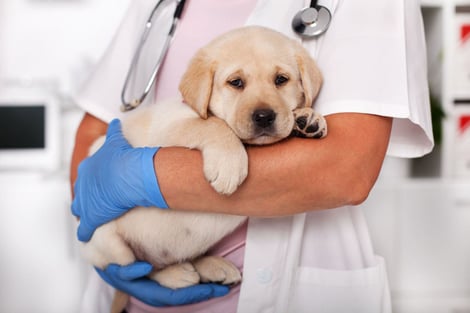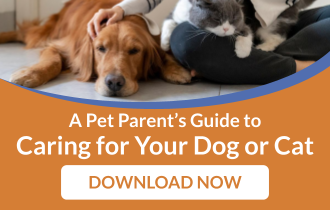
The Parvovirus Vaccine Keeps Puppies Alive
One of the saddest things — for pet parents and veterinarians — to experience is a puppy suffering with “parvo.”
All sickness is difficult for these little friends, but parvovirus is horrible, causing bloody, watery diarrhea. It’s extremely contagious, very expensive to treat, and, most important, parvovirus is preventable if puppies, their moms, and other dogs get the parvovirus vaccine.
Every dog parent should vaccinate their pups to keep them safe. If not, they need to know what parvo can do to their pups and be taught how to prevent the spread to other pups in the house.
What Is Parvovirus?
The Merck Manual of Veterinary Medicine calls canine parvovirus a “highly contagious and relatively common cause of acute, infectious GI illness in young and/or unvaccinated dogs.” This means that parvo can cause your pup to get sick suddenly.
It is just one of a large family of viruses that affect many animals and is a significant cause of death in young dogs.
Which Dogs Are Most Susceptible to Parvo?
Puppies ages 6 weeks to 6 months are the most likely to get parvo. Vaccinated moms pass on protective antibodies through nursing their puppies. That’s why it’s important for all dogs to be vaccinated against parvo. Older puppies are in danger of getting parvo until they receive a full set of vaccinations before they turn three months old.
The American Kennel Club reports that, for reasons that aren’t entirely clear, certain breeds are more likely to contract parvo, such as:
- Rottweilers
- Doberman Pinschers
- American Staffordshire Terriers
- English Springer Spaniels
- German Shepherd Dogs
- Labrador Retrievers
Signs of Parvovirus
As a veterinarian, I can tell you the most unforgettable sign of parvo is the large volume of smelly and usually bloody diarrhea. It haunts me, especially knowing that it doesn’t need to be that way — if all pups were vaccinated.
Other symptoms of parvovirus can include the following:
- Vomiting
- Fever (or too low of a temperature)
- Lethargy (listlessness)
- Anorexia (they don’t want to eat)
- Weight loss
- Weakness
- Dehydration
- Depression
What to Do if You Suspect Parvo
Contact your vet immediately. You don’t want to mess with parvo. The sooner you bring your pup in to see your veterinarian the better. When you call to make the appointment, they’ll need to know your pup has diarrhea and that you hope it’s not parvo so they can take measures to prevent the spread in the clinic to their other patients.
You’ll also want to do everything you can to keep other animals away from your puppy’s vomit and poop because that is how parvo spreads.
Unfortunately, animals begin shedding the virus within 4 or 5 days of exposure, often before showing symptoms. That’s why it’s even more important to take measures to prevent parvovirus from infecting dogs in the first place.
What’s troubling is that veterinarians are reporting a spike in the number of cases of parvo during the COVID‑19 pandemic. Skipping vaccinations is probably the cause.
How Does Parvo Spread?
Puppies are exposed to parvo in two ways:
- Direct exposure—sniffing, licking, or eating poop or vomit that contains the virus
- Indirect exposure — coming into contact with virus particles that are on things like food or water bowls, collars, and leashes, or even on people who handled infected dogs
This nasty virus can survive for up to a month indoors, and outdoors it can survive for up to a year! It must be cleaned up the right way. Not every cleaner kills parvovirus. Your veterinary team will know how to guide you through this process.
The Morris Animal Foundation, which does important work to fund research to help animals, recommends the following actions to prevent exposure:
- Keep young dogs isolated until they finish their puppy vaccinations (no dog parks)
- Keep puppies in clean environments
- Make sure that all puppies and adult dogs are vaccinated
Because mothers pass along protective antibodies in their milk, it’s especially important that any female used for breeding is vaccinated.
Parvovirus Vaccines
I can’t emphasize enough how important it is to give puppies a full course of parvovirus vaccines. Compared to treating parvo, the vaccines are inexpensive, and they are highly effective. Canine parvovirus vaccines have saved millions of lives.
The single best and cheapest way to prevent parvo is to vaccinate your dogs and puppies. Every single one of them. If you’re thinking of breeding your dogs or if they haven’t been “fixed,” make sure that you get them vaccinated. Otherwise, you risk having sick dogs, and the cleanup will not be pleasant or easy.
This is another reason to get your pups from reputable rescue organizations, shelters, or breeders that can provide proof of veterinary care with all the core vaccines. Some will offer a free veterinary visit to double‑check that your new pup is healthy. Be aware that the veterinarian will need to see any veterinary records you do have and might need to charge for any additional services needed to check out your new pup.
Your veterinarian knows when puppies or dogs need each kind of vaccine, starting as young as 6 weeks of age, so vaccinate your pups when your veterinarian tells you it is needed. If you suspect your dog is pregnant, start saving up for the vaccines and dewormings that all her puppies will need to be healthy and happy in your home.
Diagnosing and Treating Parvo
Veterinarians often recognize the telltale signs of parvo right away: smelly, bloody diarrhea, vomiting, and lethargy in a puppy that should be bounding around exploring and enjoying its new world. Since there are other things that can cause these signs, it’s best if your veterinarian can test their poop for the virus and their blood to know just how sick your pup is. If you are on a tight budget, you’re better off asking your vet to treat your pup’s symptoms and asking how to clean your home and yard to prevent the virus from spreading to other pups.
Parvovirus Treatment
There is no cure for parvovirus, but the disease can be treated if caught early. Untreated puppies only survive 9% of the time, while up to 90% of the puppies treated in vet hospitals survive parvo.
Treatment is expensive, and infected pups are not happy. Not to mention the mess they make in and around the house with vomiting and diarrhea.
Most treatment involves providing fluids to prevent dehydration and supporting pups while their immune system fights the virus. Sometimes an infected pup will need antibiotics and a feeding tube. Scientists are looking for other treatment options for infected pups.
The first few days are critical. The AKC says that most puppies (68‑92%) that are treated by a veterinarian do recover — if they survive the first 3‑4 days. The Morris Animal Foundation says that if finances are a concern, ask your veterinarian to provide initial treatment at the clinic and ask them to show you how to treat your pup at home and keep others safe. This involves learning how to give fluids under the skin, cleaning your home, and keeping your pup away from other puppies and dogs. It may also mean giving your pup medications. This can still be quite expensive and can take more effort than you can give. In these cases, have an honest conversation about whether euthanasia might be the best solution under the circumstances.
Some studies show that parvovirus survivors might have more stomach and intestinal problems later in life.
A Parvo‑Free World
I look forward to a time when I never hear about another adorable pup suffering from the symptoms of canine parvovirus.
If everyone keeps their puppies up to date on vaccinations, strives to keep young dogs in clean homes, and supports efforts to vaccinate dogs, this future is possible.

